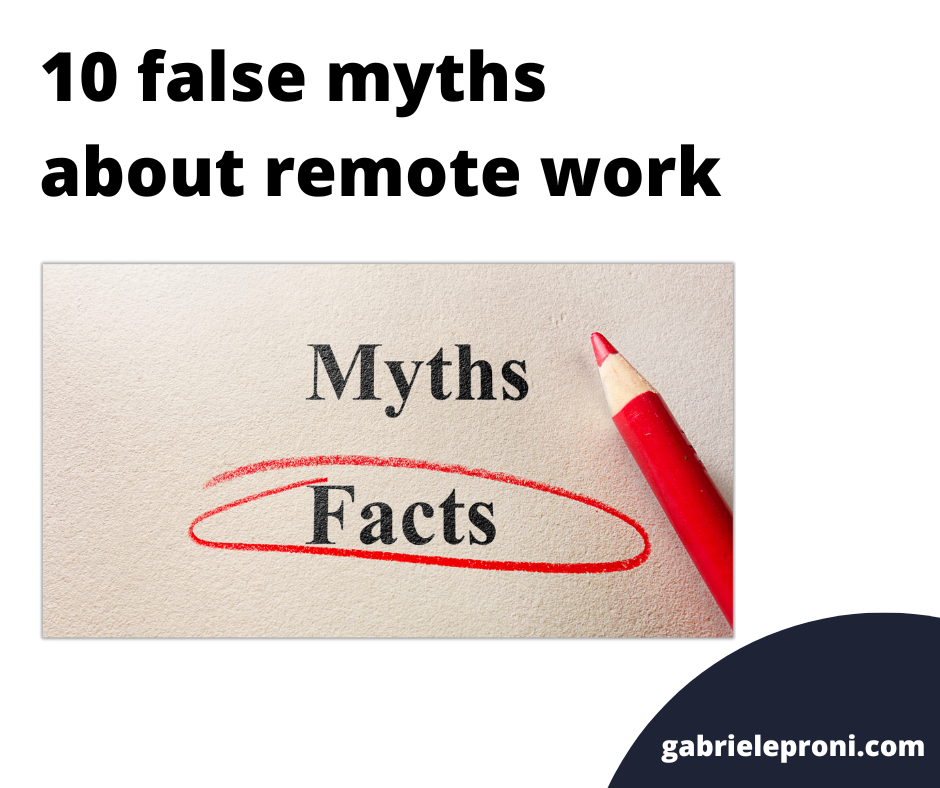This Saturday, I’ll talk about the 10 false myths about remote work.
You don’t need to go remote because “everybody does.”
Not every role can produce the best ROI remotely, and it’s not a crime.
 Would your team need to be physically in the same room?
Would your team need to be physically in the same room?
 Could your team work remotely as they do in the office?
Could your team work remotely as they do in the office?
 In most cases, the answer is simple and is NO.
In most cases, the answer is simple and is NO.

1) Remote work means productivity decrease
A study by Harvard Business Review proved precisely the opposite.
Working remotely increases by 13.5% the productivity.
But note: You will not get this productivity boost for free.
You should evolve the way your team communicates to be asynchronous.
For example, read this past issue about standup meetings.
2) Remote workers are out of contact
Just because remote workers are not in an office doesn’t mean they’re off having a picnic somewhere.
A survey by TINYpulse proved that 52% of remote workers reported having contact with their manager at least once daily.
The secret is to structure a Goal-based work framework to reduce the need to watch your teammates while working.
Plan, execute, and evaluate results.
3) Remote work means your Data is unsafe
Don’t think that if you have an office with your laptops will make a difference in having your data safe.
Someone who intends to steal information will do so regardless of work location.
Like many issues with remote work, this is people’s problem, not location problems.
4) Communication suffers
Communication will suffer if you communicate in the same way you were used to doing in your physical office (synchronously).
Communication will be even better if you use the right tools and frameworks to help employees dive into meaningful work (I’m a slack fan!).
It’s crucial to outline clear expectations and tools for communication.
5) Meetings are ineffective
Meetings can be ineffective both physically or virtually.
It’s all about how you run a meeting.
It’s all about FOCUS.
To know more, read the past issue about productive meetings.
6) Remote workers are lonely
Working remotely doesn’t mean staying home alone the whole day.
Working alone it’s not the only option.
Plenty of coffee shops, libraries, and coworking are very popular among remote workers.
Remote working offers more freedom to choose the best way to work.
7) Remote work increases costs
That’s precisely the opposite!
Remote workers are cheaper, even if you provide desks and equipment.
The costs decrease because office spaces are not needed.
Furniture is not required.
You save money for coffee, food, and paper.
Plus, remote workers value the impact of commuting costs on their salaries.
It means you can be more competitive in the market if you pay the same wage to work from home.
8) Company culture suffers
Let’s be fair: you can’t reproduce the same office camaraderie remotely.
And you don’t have to.
I wrote about remotize the boiler room effect in this past issue.
9) Remote workers are working 24/7
Remote working gives a significant boost to productivity and also reduces a lot the idle time.
But be aware: there is a high risk of letting your teammates go into burnout with a terrible impact on your business.
The key is to keep a fair working/life balance thanks to the proper working framework.
You’ll obtain the maximum ROI and build a happy and lasting team.
10) Netflix is streaming all-day
Stop thinking that if you don’t see what your teammate is doing, he’s not working.
Ultimately, if your teammate will deliver on time and give you the ROI you expect, what do you want more?
About the Newsletter
1 actionable tip on remote management in your inbox every Saturday morning.
Subscribe